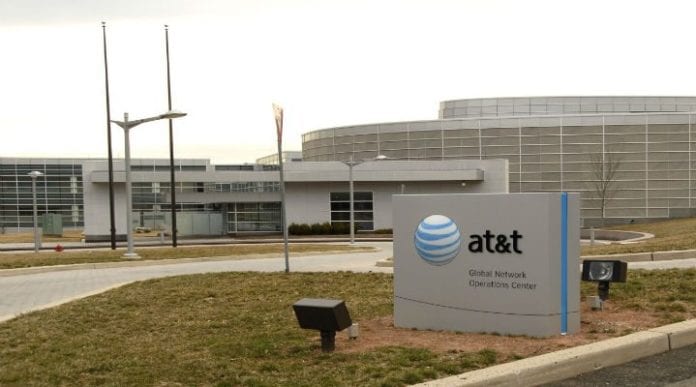AT&T claims Dish Network’s DE bidding arrangements clouded process
Looks like you can add AT&T to the list of companies unhappy with how Dish Network participated in the Federal Communications Commission’s recently concluded Auction 97 process.
In a blog post on the company’s website, AT&T VP of federal regulatory Joan Marsh, lashed Dish Network’s bidding practices, which saw Dish pick up the most number of licenses in the auction while garnering a $3 billion discount by backing a pair of designated entities.
“I’m confident much more will be discovered about these DEs as the FCC undertakes its long form review, but this is what we already know,” Marsh stated. “Dish incorporated two DEs maintaining an 85% ‘non-controlling’ financial interest in both. Dish then entered into a joint bidding arrangement with both DEs. We also know that Dish and the two DEs routinely triple bid licenses (inflating demand) until Dish dropped out of the auction and then the DEs double bid them routinely thereafter.”
Dish Network’s Auction 97 winnings came from its DE bidding partners SNR Wireless LicenseCo and Northstar Wireless, which prior to the auction were granted designated entity status as they each reported less than $15 million in annual revenue. DE rules allow for a 15% credit for small businesses, which are those with annual gross revenue of less than $40 million for the preceding three years, and 25% for “very small business,” or those with less than $15 million in annual gross revenue. Dish Network has annual revenues nearing $14 billion.
In breaking down bidding activity, Marsh said SNR and Northstar triple and double bid nearly 4,000 times, which at one point in the auction had the two bidders on the hook for $30 billion in total potential winning bids.
“None of this suggests independent decision making by either of the DE bidders, which ultimately won over $13 billion worth of licenses with a $3 billion ‘small business’ discount,” Marsh explained. “This conduct circumvented auction activity rules, masked actual demand and distorted the auction. As a result, Dish the corporate entity won no licenses. The Dish DEs, who each enjoyed a 25% discount, won substantial allocations.”
T-Mobile US also called into question Dish Network’s tactics, with company CEO John Legere in describing the auction as a “disaster for American wireless consumers,” noting that FCC rules “actually allowed companies that don’t provide wireless service at all to buy up huge amounts of spectrum and sit on it for ten years.”
Post auction, Marsh noted that Dish controlled an average of 81 megahertz of wireless spectrum across the nation’s top 100 markets, with none of that spectrum current supporting wireless telecom services. Dish has reportedly been in talks for years with established operators about setting up a network partnership in order to use its spectrum holdings running across already deployed networks, but has yet to strike a deal.
It should also be noted that AT&T is in the process of acquiring Dish Network’s satellite television rival DirecTV for $48.5 billion.
Following the close of the auction, Dish Network put out a statement highlighting its participation in the process through its partners.
“As part of the auction process, we publicly filed an application to participate as a potential bidder, and Dish invested in two entities that also publicly applied to participate in the auction as designated entities,” Dish stated.
Immediately after the auction concluded, FCC Commissioner Ajit Pai put out a statement requesting that FCC Chairman Tom Wheeler begin an investigation into the DE program, noting Dish Network’s ability to participate as a DE “makes a mockery of the DE program.”
The FCC’s DE program has been a flashpoint since its inception ahead of the PCS auctions in the mid-90s. The move was initially an attempt by the FCC to inject more competition into the mobile telecom space, with a focus on minority- or woman-owned small businesses. However, established operators have used the rules to partner with entities granted DE status to get their hands on licenses for a discount, a move that had been expected since the beginning.
The FCC has attempted to curtail abuse of the DE program by setting up build-out requirements for licenses that would force operators to put spectrum to work and keep out those that may look to sit on licenses before flipping them to larger operators. Those requirements have met with limited success as license holders have found ways to meet the rules, while in actuality not offering a commercial wireless service.
AT&T itself came out as the biggest spender in Auction 97, forking over nearly $18.2 billion in total winning bids. AT&T’s significant investment was not a surprise as analysts noted the carrier was in need of the midrange spectrum up for bid in order to bolster capacity across its network. AT&T Mobility has initially launched LTE services using a scattering of 700 MHz licenses, but was seen as being a bit thin in the 1.7/2.1 GHz band that has become the standard for adding capacity. AT&T had previously controlled a strong amount of spectrum in the AWS-1 band, but was forced to hand over most of it as part of its failed attempt to acquire T-Mobile US.
AT&T said Auction 97 provided it with 20 megahertz of spectrum in the 1.7/2.1 GHz band covering 96% of the country’s population. The carrier noted it planned to begin using the 2.1 GHz portion of the spectrum to support downlink services, while working with current spectrum users in the 1.7 GHz uplink channel to bring on additional capacity “as soon as possible.”
Bored? Why not follow me on Twitter

